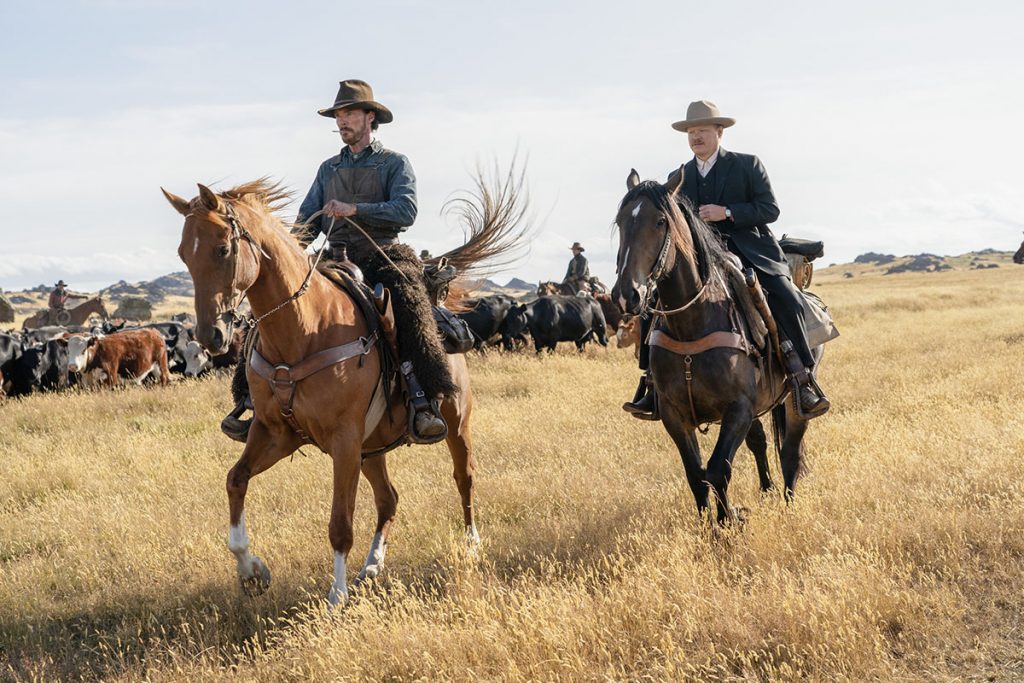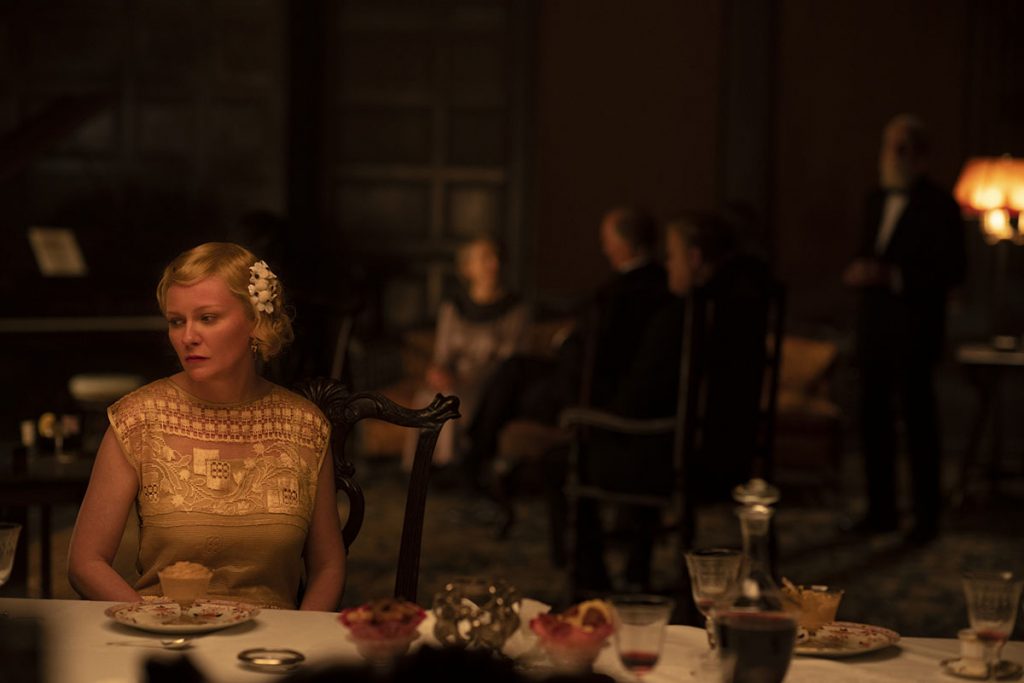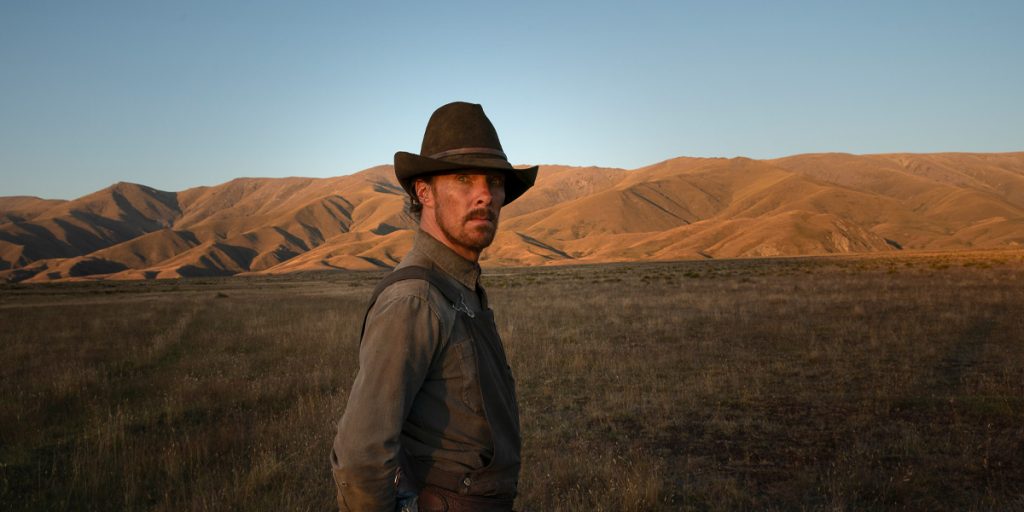Anchored by a career-best Benedict Cumberbatch, The Power of the Dog is a methodically paced but masterfully mesmerizing masterwork.
One of the most prevalent narratives in the film industry today is the push for more female directors. Whether they be working in genre features (Patty Jenkins with Wonder Woman, Cate Shortland with Black Widow, etc.) or prestige fare (Chloé Zhao with Nomadland, Emerald Fennell with Promising Young Woman, etc.), these working women are continually elevated as beacons of hope for fledging female filmmakers, and, because of this extra attention, their films also often ignite intense social discourse in regards to both their critical and commercial success, making each female-directed feature feel like the “be-all-end-all” for women in this profession today. Nevertheless, many of the female directors in this generation can at least find solace in times of struggle in their contemporaries; however, just thirty years prior, this wasn’t a luxury afforded to the likes of Jane Campion.
Despite being only the second (!) woman nominated for Best Director – and even winning the Oscar for Best Original Screenplay for The Piano – Hollywood didn’t know what to do with a talent like Campion, and the opportunities that exist for female filmmakers today were never offered to her. As a result, after working on four more features that unfortunately failed to capture the same critical and commercial acclaim as The Piano (The Portrait of a Lady, Holy Smoke!, In the Cut, and Bright Star), Campion retreated from film in 2009, and nowadays, one of the trailblazers for female directors is hardly acknowledged by the likes of Film Twitter. However, all of that is (hopefully) set to change with the release of her hotly anticipated cinematic comeback The Power of the Dog, a scintillating saga of social warfare set in the middle of 1925 Montana, where a charismatic cowboy causes hell for all who get in his way – but soon meets his match.
Said charismatic cowboy is the petrifying Phil Burbank (Benedict Cumberbatch, of Doctor Strange and Sherlock), a respected rancher in his hometown who works alongside his brother George (Jesse Plemons, of The Irishman and Judas and the Black Messiah), a much meeker presence who consistently receives Phil’s rage for his perceived “softness.” One evening when Phil and George are eating dinner at a local establishment with their ranching companions, Phil acts so savagely to the proprietress, Rose Gordon (Kirsten Dunst, of Spider-Man and Eternal Sunshine of the Spotless Mind), and her submissive son Peter (Kodi Smit-McPhee, of X-Men: Apocalypse and Dawn of the Planet of the Apes) that he drives them both to tears, while the ranchers look on and snicker at their suffering. Well, all of the ranchers except for George.

George soon returns to Rose a few days later, apologizing for his brother’s behavior and a striking up a courtship with the widow- one built from genuine affection towards and appreciation for one another. When this courtship turns into marriage and Rose becomes a permanent fixture on the Burbank ranch, Phil is predictably furious, viewing her as an intruder in their carefully curated enterprise and going out of his way to emotionally torment her to the point of exhaustion. The pestering poor Peter faces is even more malicious, especially as Phil’s cowhands enthusiastically join in on the joshing. However, when Phil unexpectedly finds himself drawn to this boy, taking him under his wing and teaching him his “manly ways,” this new relationship might just be his chance at personal redemption – or ruination.
As soon as the film starts, one is immediately consumed in the chilling atmosphere Campion has cultivated here – an atmosphere dripping with dread and disquietude. This masterful grasp on mood continues the whole way through, never allowing the audience to feel at ease over the course of The Power of the Dog’s two-hour runtime and making us think that we too are a potential “victim” of Phil Burbank’s, awaiting our turn for one of his signature verbal thrashings. Working in tandem with Campion’s deliberate direction is the commendable Cumberbatch, in what will be universally lauded as his career-best performance. As this larger-than-life monster of a man, his Phil Burbank is the epitome of toxic masculinity, making it his sole goal to snuff out any ounce of “softness” in his immediate environment and replace it with rancor and resentment, particularly viewing the cordiality of Rose and Peter as a wretched weakness that he cannot condone.
While this side of Phil feels like Cumberbatch’s riff on Daniel Day-Lewis’ Daniel Plainview from There Will Be Blood, there’s so much more to the man than that oversimplification would lead you to believe, with a buried sensitivity deep below his surface that Cumberbatch only showcases in spurts, quickly concealing it once more as soon as he “slips up” but so clearly detesting the disagreeable disposition he has established for himself and must retreat to. Still, he hates who he is too much to ever reveal this truth, and if he must live in misery, so will everyone else. Cumberbatch thus makes Phil’s most aggressive acts look less like willful choices and more like a necessity for his survival; if he can’t find any peace, he won’t be able to make do if everyone isn’t as miserable as he is. Smit-McPhee’s Peter is the only person to make Phil think that another life might be possible – that there may be an escape from his enmity – but the script allows Phil no such “easy out” with tantalizing twists that show how we all pay for our sins at one point or another.

Speaking of Campion’s screenplay, her adaptation, whilst faithful to the source material, is also more ambiguous – admirably so – leaving character decisions and motivations suggested rather than explicitly spelled out. Such a storytelling technique pays off in spades, as the film refuses to tell us how to think or what to think about these characters, allowing us to come to our own assumptions about their actions and intentions, with Campion providing just enough breadcrumbs to coax us in the right direction but otherwise limiting her interference. We too feel like a player in this war of wits between Phil and Rose or Phil and Peter, never quite sure who’s on top or what their ultimate plan is. And, as soon as we think we’re catching onto someone’s schemes, we realize that one character has been playing checkers this whole time, while the other was playing chess. The way Campion is able to reframe perspectives between her protagonists is nothing short of stunning, constantly altering our perception of who has the most “power” in the narrative.
The meat of the narrative is reserved for Phil and Peter’s relationship – with both Cumberbatch and Smit-McPhee oscillating between fear and flirtation beautifully – but Kirsten Dunst’s work as Rose should not be overlooked in spite of her status as a more “reactive” presence in the picture, as her devolution from beacon of hope to broken housewife is brutal to behold, and Dunst makes the most of her shorter screentime to sell this plaintive sadness – and the eventual alcoholism it leads to – with impressive integrity. Plemons is a pleasant companion for her (and their real-life chemistry bleeds into the film, making their courtship even cuter), but he does have the least to do of the four main cast members, even if he still grounds George in a gentle genuineness that proves essential for establishing his contrast with Phil.
Also of note is the sensationally suspenseful score from composer Jonny Greenwood (Phantom Thread, There Will Be Blood), complementing Campion’s dark depiction of this familial drama with tracks that tease the onset of ominous evils, leaving us unable to find any scene of serenity throughout the entire story. Ari Wegner’s (Zola, In Fabric) consummate cinematography also works to emphasize the emptiness of the Burbank ranch and the emotional isolation it offers its inhabitants, never shying away from the sumptuous visuals of this setting but always reminding viewers of the solemnity that surrounds these characters at all times as well.
While Jane Campion’s contribution to the western genre starts as a startling character study of a cowboy sociopath – with this perplexing personality brought to life by the terrifying talents of Benedict Cumberbatch – The Power of the Dog soon morphs into a much larger story, detailing the ways power can be shifted and shared in society and at times, even stolen. In the end, this tragic tale illustrates how, no matter the momentary gains one may accumulate via the perpetuation of toxically aggressive temperament, the target set on your back isn’t worth the temporary prestige, as everyone – yes, even the mighty Phil Burbank – has an Achilles heel (or a repressed identity), and when it’s discovered, the former violator soon becomes the new victim, leaving themselves vulnerable to the same pain they’ve perpetuated for years.
The Power of the Dog premiered at TIFF in September 2021 and is now available to watch on Netflix, on digital, and on demand.

